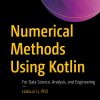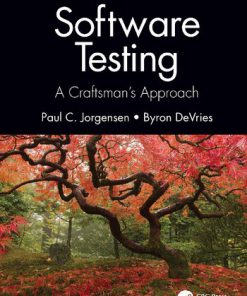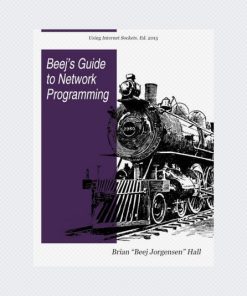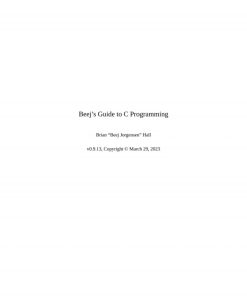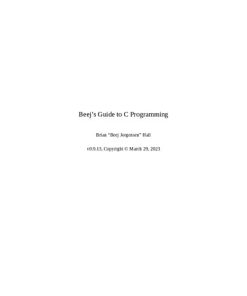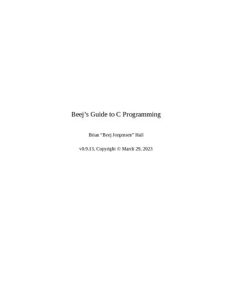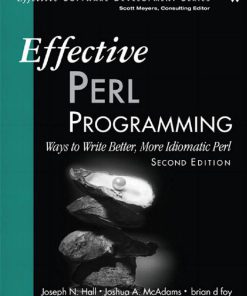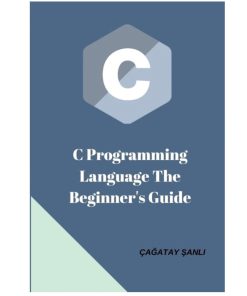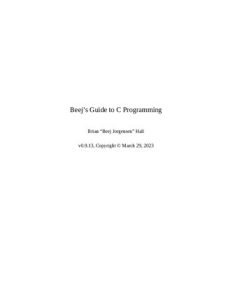Beej s Guide to C Programming 1st Edition by Brian Beej Jorgensen Hall
$50.00 Original price was: $50.00.$25.00Current price is: $25.00.
Beej s Guide to C Programming 1st Edition by Brian Beej Jorgensen Hall – Ebook PDF Instant Download/Delivery:
Full download Beej s Guide to C Programming 1st Edition after payment
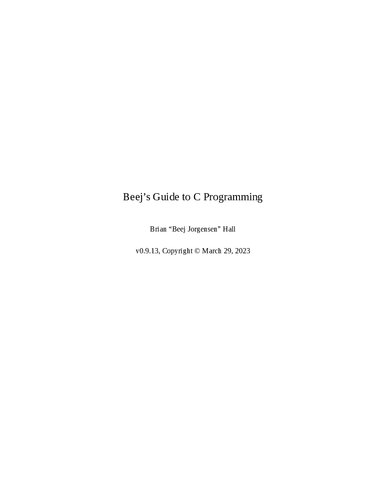
Product details:
Author: Brian Beej Jorgensen Hall
a beginner-friendly, informal introduction to the C programming language. Written in Beej’s signature conversational tone, the guide walks readers through the core concepts of C—from variables, data types, and control structures to pointers, memory management, and file I/O—making often-intimidating topics more approachable. It balances clear explanations with practical examples and thoughtful insights about how C works under the hood. Ideal for aspiring programmers and curious developers, the guide encourages hands-on learning and builds a solid foundation for further exploration in systems programming or other low-level computing domains.
Beej s Guide to C Programming 1st Edition Table of contents:
1. Introduction
1.1 Audience
1.2 How to Read This Book
1.3 Platform and Compiler
1.4 Official Homepage
1.5 Email Policy
1.6 Mirroring
1.7 Note for Translators
1.8 Copyright and Distribution
1.9 Dedication
2. Hello, World!
2.1 What to Expect from C
2.2 Hello, World!
2.3 Compilation Details
2.4 Building with gcc
2.5 Building with clang
2.6 Building from IDEs
2.7 C Versions
3. Variables and Statements
3.1 Variables
3.2 Variable Names
3.3 Variable Types
3.4 Boolean Types
4. Operators and Expressions
4.1 Arithmetic
4.2 Ternary Operator
4.3 Pre-and-Post Increment-and-Decrement
4.4 The Comma Operator
4.5 Conditional Operators
4.6 Boolean Operators
4.7 The sizeof Operator
5. Flow Control
5.1 The if-else Statement
5.2 The while Statement
5.3 The do-while Statement
5.4 The for Statement
5.5 The switch Statement
6. Functions
6.1 Passing by Value
6.2 Function Prototypes
6.3 Empty Parameter Lists
7. Pointers—Cower in Fear!
7.1 Memory and Variables
7.2 Pointer Types
7.3 Dereferencing
7.4 Passing Pointers as Arguments
7.5 The NULL Pointer
7.6 A Note on Declaring Pointers
7.7 sizeof and Pointers
8. Arrays
8.1 Easy Example
8.2 Getting the Length of an Array
8.3 Array Initializers
8.4 Out of Bounds!
8.5 Multidimensional Arrays
8.6 Arrays and Pointers
8.7 Getting a Pointer to an Array
8.8 Passing Single Dimensional Arrays to Functions
8.9 Changing Arrays in Functions
8.10 Passing Multidimensional Arrays to Functions
9. Strings
9.1 String Literals
9.2 String Variables
9.3 String Variables as Arrays
9.4 String Initializers
9.5 Getting String Length
9.6 String Termination
9.7 Copying a String
10. Structs
10.1 Declaring a Struct
10.2 Struct Initializers
10.3 Passing Structs to Functions
10.4 The Arrow Operator
10.5 Copying and Returning Structs
10.6 Comparing Structs
11. File Input/Output
11.1 The FILE* Data Type
11.2 Reading Text Files
11.3 End of File: EOF
11.4 Reading a Line at a Time
11.5 Formatted Input
11.6 Writing Text Files
11.7 Binary File I/O
11.8 Struct and Number Caveats
12. typedef: Making New Types
12.1 typedef in Theory
12.2 Scoping
12.3 typedef in Practice
12.4 typedef and structs
12.5 typedef and Other Types
12.6 typedef and Pointers
12.7 typedef and Capitalization
12.8 Arrays and typedef
13. Pointers II: Arithmetic
13.1 Pointer Arithmetic
13.2 Adding to Pointers
13.3 Changing Pointers
13.4 Subtracting Pointers
13.5 Array/Pointer Equivalence
13.6 Array/Pointer Equivalence in Function Calls
13.7 void Pointers
14. Manual Memory Allocation
14.1 malloc() and free()
14.2 Error Checking
14.3 Allocating Space for an Array
14.4 calloc()
14.5 realloc()
14.6 realloc() with NULL
14.7 Aligned Allocations
15. Scope
15.1 Block Scope
15.2 Where to Define Variables
15.3 Variable Hiding
15.4 File Scope
15.5 for-loop Scope
15.6 A Note on Function Scope
16. Types II: More Types
16.1 Signed and Unsigned Integers
16.2 Character Types
16.3 More Integer Types
16.4 Floating Point Types
16.5 Decimal Digits and Precision
16.6 Converting to Decimal and Back
17. Types III: Conversions
17.1 String Conversions
17.2 Numeric Conversions
17.3 Boolean Conversions
17.4 Implicit and Explicit Casting
17.5 Integer Promotions
17.6 Arithmetic Conversions
18. Types IV: Qualifiers and Specifiers
18.1 const, restrict, volatile, _Atomic
18.2 auto, static, extern, register, _Thread_local
19. Multifile Projects
19.1 Includes and Prototypes
19.2 static and extern
19.3 Compiling with Object Files
20. The Outside Environment
20.1 Command Line Arguments
20.2 Exit Status
20.3 Environment Variables
21. The C Preprocessor
21.1 #include, Macros, Conditionals
21.2 Built-in and Mandatory Macros
21.3 Macros with Arguments
21.4 Stringification and Concatenation
21.5 #error, #pragma, #line
22. Structs II: More Fun
22.1 Nested Structs and Arrays
22.2 Anonymous and Self-Referential Structs
22.3 Flexible Array Members
22.4 Padding, offsetof
22.5 Bit-Fields
23. Unions
23.1 Type Punning
23.2 Common Initial Sequences
23.3 Anonymous Structs in Unions
24. Characters and Strings II
24.1 Escape Sequences
24.2 Enumerated Types: enum
25. Pointers III: Pointers to Pointers
25.1 Pointers to Pointers and const
25.2 Multibyte Values
25.3 Function Pointers
26. Bitwise Operations
26.1 AND, OR, XOR, NOT
26.2 Bit Shifts
27. Variadic Functions
27.1 va_list and Ellipses
27.2 Standard Library Use
28. Locale and Internationalization
28.1 Localization Basics
28.2 Unicode
28.3 Wide Characters
28.4 UTF-8/16/32
29. Standard Library Functions Overview
29.1 I/O, Conversion, String, Memory
29.2 Classification, Search, Length
30. Exiting a Program
30.1 Normal and Abnormal Exits
30.2 exit(), quick_exit(), _Exit(), abort()
30.3 assert(), atexit()
31. Signal Handling
31.1 signal(), Handlers, Safety
32. Variable-Length Arrays (VLAs)
32.1 Basic and Multidimensional VLAs
32.2 Function Parameters
32.3 Compatibility
33. Jumping Pitfalls
33.1 goto and Scope
33.2 setjmp and longjmp
34. Incomplete Types
34.1 Use Cases and Errors
34.2 Completing Definitions
35. Complex Numbers
35.1 Declaration and Operations
36. Fixed Width Integer Types
36.1 Types, Constants, Limits, Formats
37. Date and Time
37.1 Types and Formatting
38. Multithreading
38.1 Threads, Mutexes, Condition Variables
38.2 _Thread_local, Atomics, Memory Order
People also search for Beej s Guide to C Programming 1st Edition:
c programming best practices pdf
zybooks c programming
zybooks c programming answers
z/os c/c++ programming guide
guide to c programming
Tags: Brian Beej Jorgensen Hall, Beej s Guide, C Programming
You may also like…
Computers - Programming
Computers - Programming
Computers - Programming
Computers - Programming
Beej s Guide to C Programming 1st Edition by Brian Beej Jorgensen Hall
Computers - Programming
Computers - Programming
Let Us C Authentic guide to C programming language 19th Edition Yashavant Kanetkar
Computers - Programming
Effective Perl Programming 2nd Edition by Joseph, Joshua ,Brian 9780321496942 0321496949
Computers - Programming

